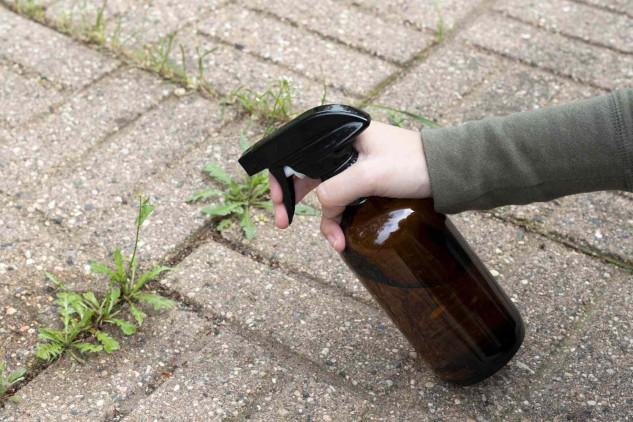
In This Article
- Why are weeds a problem in concrete cracks?
- How can boiling water eliminate weeds?
- Can vinegar and baking soda naturally prevent weed growth?
- Why use salt for weed control, and what are the precautions?
- Simple tips for regular maintenance to keep cracks weed-free.
How to Prevent Weeds in Concrete Cracks Naturally
by Robert Jennings, InnerSelf.com
Weeds growing in the cracks of our driveways, patios, and sidewalks can be an unsightly nuisance. They seem to spring up out of nowhere, often making us reach for harsh chemical herbicides to keep them at bay. But what if we could manage these persistent plants in a way that doesn’t harm the environment? Several natural methods can prevent weeds and grass from sprouting up in these pesky cracks without chemicals or toxins. This article will explore five effective, eco-friendly ways to naturally handle weeds and reclaim those concrete spaces.
Boiling Water Treatment: Simple, Effective, and Chemical-Free
One of the easiest and most effective methods to prevent weed growth is by using something we all have access to-boiling water. The heat from boiling water essentially ‘cooks’ the plants, breaking down their cellular structure and killing them right at the root. This method benefits concrete areas since there’s no need to worry about contaminating soil or harming nearby plants. It’s as simple as pouring the water directly onto the weeds growing in the cracks, and you’ll notice that many of them wilt and die almost immediately. This simple yet powerful method puts the control back in your hands, empowering you to manage your outdoor spaces without the need for harsh chemicals.
For best results, bring water to a rolling boil, then carefully pour it over the weeds, ensuring it reaches the base of the plant in the crack. This approach can be repeated as needed, especially for more enormous or more resilient weeds that may require multiple treatments. While this won’t prevent new weeds from sprouting later, it’s a safe, chemical-free way to keep them under control. Just be cautious when handling boiling water to avoid any burns.
White Vinegar Solution: Drying Out Weeds with Acidity
Another effective natural remedy for weed control involves the use of white vinegar. Household vinegar, typically with 5% acetic acid content, can dry out weeds when applied directly. The acidity damages the plant’s cell walls, causing it to wilt and die over time. Mix equal parts vinegar and water in a spray bottle to make a practical solution, then apply the mixture directly onto the weeds. A sunny day is ideal for this treatment, as the sun helps enhance the vinegar’s drying effect.
For tougher weeds, you might consider using horticultural vinegar with a higher acetic acid concentration. However, it should be used with caution around other plants. Additionally, while vinegar is excellent at killing weeds on the surface, it may not reach the deeper roots. Regular applications might be necessary to prevent regrowth. Still, vinegar remains a safe, eco-friendly choice for managing unwanted plants in concrete cracks.
Baking Soda: A Safe Barrier Against Weed Seeds
Baking soda isn’t just for baking; it’s also a powerful, non-toxic tool for preventing weed growth. Sprinkling a little baking soda along the cracks in your concrete can help prevent weed seeds from taking root. Sodium in baking soda creates an alkaline environment unfriendly to weeds, making it difficult for them to germinate and grow. Additionally, baking soda can dry out young seedlings just starting to sprout, keeping them from developing into mature plants.
To use, simply sprinkle baking soda liberally in the cracks where weeds tend to grow. For best results, apply baking soda on a dry day to avoid being washed away by rain. This method is beneficial for regular upkeep, as it can act as a deterrent, keeping cracks weed-free over time. Plus, it’s an affordable and safe option that won’t harm the environment or neighboring plants. By choosing this cost-effective method, you can effectively manage weed growth without breaking the bank, making you a savvy homeowner.
Salt Solution: A Strong Deterrent with Caution
Salt, another everyday household item, can be an effective weed deterrent. Like baking soda, salt inhibits plant growth by creating a harsh environment for weeds. However, it’s essential to use salt sparingly and carefully, as it can affect the surrounding soil and harm other plants. A simple solution of table salt and water, applied directly to cracks in the concrete, can prevent weeds from sprouting up.
To make the solution, dissolve a cup of salt in a gallon of water and carefully pour it into the cracks where weeds grow. Salt is particularly effective because it penetrates deep into the soil, dehydrating weeds and preventing regrowth. However, it’s best to avoid using salt near lawns or gardens, as it can damage beneficial plants if it leaches into surrounding soil. As a long-term solution, salt can be effective, but caution is required to avoid unintended harm to other parts of your yard.
Preventing Seeds from Taking Root
Regular maintenance is one of the simplest yet often overlooked methods for preventing weeds in concrete cracks. By sweeping and frequently cleaning your driveway, patio, or sidewalk, you can reduce the likelihood of seeds finding a home in those cracks. Weeds often sprout in areas where dirt and debris accumulate, providing a small bed for seeds to settle and grow. By keeping these areas clear, you’re taking away the opportunity for seeds to find a home. This proactive approach puts you in control of your outdoor spaces, ensuring that weeds don't get the chance to sprout.
Additionally, addressing cracks as soon as they appear can reduce the likelihood of weeds taking hold. Small cracks can quickly widen as weeds grow, so filling in cracks or repairing damage promptly can make a significant difference. While maintenance may seem tedious, it’s an effective preventive measure that ensures those unsightly weeds don’t get the chance to sprout.
The Benefits of Choosing Natural Solutions
Why choose natural methods over chemical herbicides? Conventional weed killers often contain harmful substances like glyphosate, which can pose risks to our health and the environment. Studies have shown that glyphosate and other chemicals in herbicides can leach into groundwater, affecting ecosystems and potentially impacting human health. In contrast, natural methods like boiling water, vinegar, baking soda, and salt are safer alternatives that allow us to care for our outdoor spaces without introducing toxins.
Using natural methods also promotes a healthier relationship with our surroundings. Natural remedies encourage us to work harmoniously with nature instead of resorting to quick fixes that harm the ecosystem. These methods may require more patience and consistency. Still, they offer a sustainable way to manage weeds without adversely affecting the environment or our well-being.
Incorporating These Methods for Lasting Results
Try combining several of these methods for the best results for a multi-faceted approach. Start with regular maintenance to clear the area, then apply baking soda or vinegar to deter new growth. Boiling water can be used for any existing weeds that crop up. At the same time, salt can provide a more substantial barrier in areas where weeds are remarkably persistent.
As with many natural solutions, consistency is critical. Applying these methods regularly will make it easier to keep weeds at bay without reaching for harmful chemicals. Over time, these efforts will yield clean, crack-free concrete that enhances the beauty and safety of your outdoor spaces.
Managing weeds naturally benefits the environment and allows us to take a more mindful approach to home care. Each method, from boiling water to baking soda, offers a safe, eco-friendly alternative to chemicals that harm the earth. With a bit of patience and regular effort, it’s possible to maintain a clean, weed-free concrete surface while honoring our responsibility to the planet.
In the end, it’s about choosing solutions that reflect our values. When we opt for natural methods, we make a small but significant choice to nurture our surroundings and support a healthier, more sustainable way of life. So, the next time weeds pop up in those cracks, consider reaching for boiling water or vinegar. It’s a step toward cleaner spaces and cleaner earth.
Article Recap
Prevent weeds in concrete cracks naturally with simple, effective methods like boiling water, vinegar, and baking soda. These eco-friendly weed control techniques offer a safe alternative to chemicals, helping to maintain clean, crack-free concrete surfaces while protecting the environment. Discover how to use household ingredients to keep your sidewalks and driveways free from stubborn weeds.
About the Author
 Robert Jennings is co-publisher of InnerSelf.com with his wife Marie T Russell. He attended the University of Florida, Southern Technical Institute, and the University of Central Florida with studies in real estate, urban development, finance, architectural engineering, and elementary education. He was a member of the US Marine Corps and The US Army having commanded a field artillery battery in Germany. He worked in real estate finance, construction and development for 25 years before starting InnerSelf.com in 1996.
Robert Jennings is co-publisher of InnerSelf.com with his wife Marie T Russell. He attended the University of Florida, Southern Technical Institute, and the University of Central Florida with studies in real estate, urban development, finance, architectural engineering, and elementary education. He was a member of the US Marine Corps and The US Army having commanded a field artillery battery in Germany. He worked in real estate finance, construction and development for 25 years before starting InnerSelf.com in 1996.
InnerSelf is dedicated to sharing information that allows people to make educated and insightful choices in their personal life, for the good of the commons, and for the well-being of the planet. InnerSelf Magazine is in its 30+year of publication in either print (1984-1995) or online as InnerSelf.com. Please support our work.
Creative Commons 4.0
This article is licensed under a Creative Commons Attribution-Share Alike 4.0 License. Attribute the author Robert Jennings, InnerSelf.com. Link back to the article This article originally appeared on InnerSelf.com



























